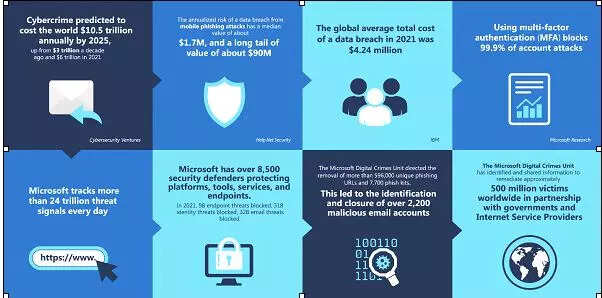The discussion focused on the rising tTech support scams across the country and the need for industry wide partnerships to address this. The speakers emphasized on how cyberattacks have increased not just in size and scale but also in sophistication over the last two years, sharing insights on the evolution of cybersecurity and tech support scams. Mary Jo Schrade spoke about how Microsoft Digital Crimes Unit (DCU) is helping combat cybercrime. The Microsoft DCU comprises an international team of technical, legal, and business experts focused on fighting cybercrime. It helps combat tech support scams by partnering with law enforcement, strengthening technology, and educating consumers.

According to Microsoft’s Global Tech Support Scam Research report, 7 out of 10 consumers in India faced tech support scams in 2021. The report further says that in India, Millennials (aged 24-37) were the most susceptible to such scams in 2021, with 58% of those that continued with the scam incurring monetary loss.
Speaking at the roundtable, Mary Jo Schrade, Regional Lead, Microsoft Digital Crimes Unit, Asia, said, “Over the past few years, cybercriminals have been finding ways to exploit new vulnerabilities, driving the rise of cybercrime as an economy. Tech support scams especially are a growing challenge that needs industry-wide collaboration. It’s important to remember that cybersecurity is a team sport. The Microsoft Digital Crimes Unit works closely with partners, law enforcement and computer incident response teams across the globe to expand the scale and impact of fighting cybercrime, sharing insights to assist with victim remediation, supporting education campaigns, and developing technical countermeasures to protect our customers. We are committed to protecting our customers and providing a safe digital experience for every person and organization on the planet.”
Rama Vedashree, CEO, Data Security Council of India (DSCI) said, “The pandemic was big trigger point for India going digital and online and the consequent escalation in cyber threats. The shift to a remote working environment saw an increase in attacks and phishing campaigns, especially in digital payments and rise of ransomware attacks that targeted not just critical infrastructure providers or large enterprises but also small and medium businesses. Cybersecurity will be critical for every organization going forward and it’s important to remember that it is a shared responsibility. All of us, govt, public and private sectors need to collaborate to build a strong cybersecurity posture for India.”
For all the latest Technology News Click Here
For the latest news and updates, follow us on Google News.
